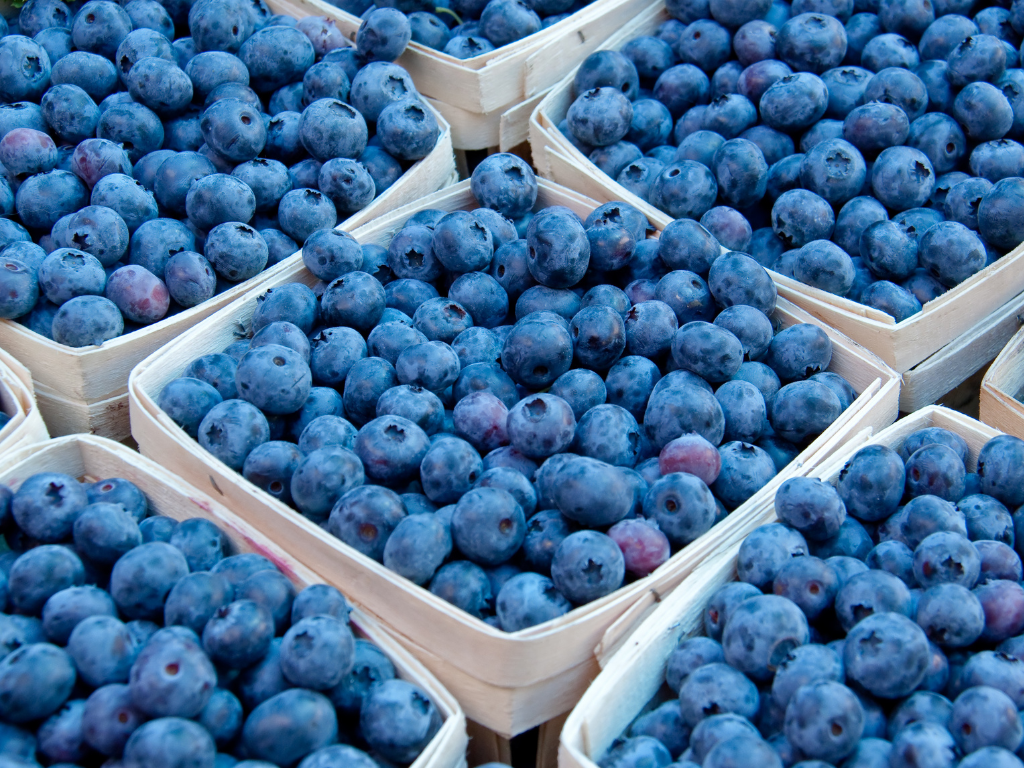Uses, Nutritional value and Health benefits of Blueberries

This post is also available in:
This post is also available in:
![]() Español (Spanish)
Español (Spanish) ![]() हिन्दी (Hindi)
हिन्दी (Hindi) ![]() Português (Portuguese (Brazil))
Português (Portuguese (Brazil))
Nutritional value of blueberries
The nutritional value of blueberries, based on data from the United States Department of Agriculture (USDA) per 100 grams (3.5 ounces) of raw blueberries is:
- Calories: 32 kcal
- Water content: 85 grams
- Carbohydrates: 9 grams
- Sugars: 5 grams
- Dietary Fiber: 2.4 grams
- Protein: 0.7 grams
- Fat: 0.4 grams
- Vitamin C: 9.7 milligrams (16% of the Recommended Daily Allowance or RDA)
- Vitamin K: 19.3 micrograms (27% of the RDA)
- Vitamin A: 54 IU (1% of the RDA)
- Vitamin E: 0.6 milligrams (3% of the RDA)
- Potassium: 77 milligrams
- Phosphorus: 12 milligrams
- Calcium: 6 milligrams
- Magnesium: 6 milligrams
- Iron: 0.3 milligrams
- Zinc: 0.2 milligrams
- Manganese: 0.3 milligrams
Uses of blueberries
Blueberries are versatile and can be enjoyed in various ways due to their flavor and numerous health benefits. Firstly, they can be used as fresh snacking. Enjoying fresh blueberries as a snack or in salads, juices, and smoothies is one of the simplest and healthiest ways to consume them. Blueberries can also be used in baked goods. They are commonly used in muffins, pancakes, scones, and cakes. Blueberries can be made into jams and preserves. They can be spread on toast, used in pastries, or paired with cheeses. Additionally, they can be used frozen. Frozen blueberries can be used in smoothies, baked goods, or as a topping for desserts. Blueberries can be cooked into a sauce used over desserts. Last but not least, dried blueberries can be used for a sweet and antioxidant-rich components snack
Health benefits of blueberries – Are blueberries really a superfood?
Blueberries owe many health benefits to a specific type of flavonoid known as anthocyanin. Flavonoids are natural compounds found in plants, often exhibiting potent antioxidant properties.
It has long been established that a diet rich in a variety of fruits and vegetables is linked to a reduced risk of numerous lifestyle-related health conditions. Multiple studies have indicated that increasing the intake of plant-based foods, including blueberries, can lower the risk of obesity, diabetes, heart disease, and overall mortality.
Managing diabetes
Research has shown that individuals with type 1 diabetes who incorporate high-fiber diets into their eating habits tend to experience lower blood glucose levels. Similarly, those with type 2 diabetes may observe improved blood sugar control and insulin sensitivity. It’s important to say that a single cup of blueberries contains 3.6 grams of dietary fiber.
A study conducted in 2013 and reported in the BMJ (British Medical Journal) suggested that consuming specific fruits might have a protective effect against developing type 2 diabetes in adults.
Throughout this study, approximately 6.5 percent of the participants eventually developed type 2 diabetes. However, the research findings indicated that individuals who included three servings per week of fruits like blueberries, grapes, raisins, apples, or pears in their diets experienced a 7% reduction in the risk of developing type 2 diabetes.
Protecting against heart disease
The presence of fiber, potassium, folate, vitamin C, vitamin B6, and phytonutrients in blueberries provides essential support for heart health. Blueberries are also beneficial for the heart due to their absence of cholesterol. The fiber content in blueberries significantly lowers overall cholesterol levels in the bloodstream, thus diminishing the risk of heart disease.
Moreover, vitamin B6 and folate prevent the accumulation of homocysteine. When homocysteine builds up excessively in the body, it can damage blood vessels, potentially leading to cardiovascular issues.
A study conducted by the Harvard School of Public Health and the University of East Anglia in the United Kingdom (U.K.) revealed that regular consumption of anthocyanins, which are present in blueberries, can decrease the risk of heart attack by 32 percent in young and middle-aged women. This research specifically found that women who included at least three servings of blueberries or strawberries in their weekly diet demonstrated more favorable outcomes regarding heart health.
Reducing the risk of cancer
Vitamin C, vitamin A, and an array of phytonutrients in blueberries protect against the harmful effects of disease-associated free radicals, functioning as antioxidants.
Studies indicate that antioxidants have the potential to impede the growth of tumors, reduce inflammation within the body, and offer protection against or decelerate the progression of various types of cancers, including those affecting the esophagus, lungs, mouth, pharynx, endometrium, pancreas, prostate, and colon. Additionally, folate, is a crucial element in DNA synthesis and repair. His role in DNA maintenance can be a barrier against developing cancer cells, particularly those arising from DNA mutations.
Improving mental health
Research conducted on populations has established a connection between the consumption of blueberries and slower cognitive decline, particularly among older women.
Furthermore, studies have revealed additional benefits of blueberries by mitigating the risk of cognitive impairment. These benefits encompass short-term memory and motor coordination enhancements in individuals who incorporate blueberries into their diets.
*Individuals taking blood-thinning medications like warfarin should consult their healthcare provider before significantly increasing their blueberry consumption due to the high vitamin K content, which can affect blood clotting.
References
https://www.bmj.com/content/347/bmj.f5001
Cassidy A, Mukamal KJ, Liu L, Franz M, Eliassen AH, Rimm EB. High anthocyanin intake is associated with a reduced risk of myocardial infarction in young and middle-aged women. Circulation. 2013 Jan 15;127(2):188-96. doi: 10.1161/CIRCULATIONAHA.112.122408. PMID: 23319811; PMCID: PMC3762447.
Subash S, Essa MM, Al-Adawi S, Memon MA, Manivasagam T, Akbar M. Neuroprotective effects of berry fruits on neurodegenerative diseases. Neural Regen Res. 2014 Aug 15;9(16):1557-66. doi: 10.4103/1673-5374.139483. PMID: 25317174; PMCID: PMC4192974.
Devore EE, Kang JH, Breteler MM, Grodstein F. Dietary intakes of berries and flavonoids in relation to cognitive decline. Ann Neurol. 2012 Jul;72(1):135-43. doi: 10.1002/ana.23594. Epub 2012 Apr 26. PMID: 22535616; PMCID: PMC3582325.
Palacios C. The role of nutrients in bone health, from A to Z. Crit Rev Food Sci Nutr. 2006;46(8):621-8. doi: 10.1080/10408390500466174. PMID: 17092827.
Pearson DA. Bone health and osteoporosis: the role of vitamin K and potential antagonism by anticoagulants. Nutr Clin Pract. 2007 Oct;22(5):517-44. doi: 10.1177/0115426507022005517. PMID: 17906277.









































































